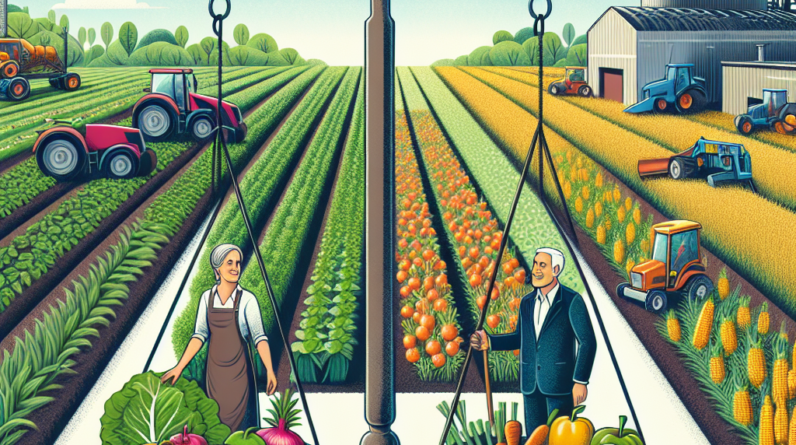
1. Understanding the Basics of Organic and Conventional Foods
Defining Organic Foods
When I first started digging into organic foods, I was surprised at how strict the regulations are. Organic food must be produced without synthetic pesticides and fertilizers. The idea is to promote biodiversity and ecological balance. It’s kinda mind-blowing to think that what I eat can support a sustainable farming method!
Get a Huge Discount and Bonus! Try for 90 Days Risk Free
Organic farming also prohibits the use of genetically modified organisms (GMOs). This was a game-changer for me because it made me pay closer attention to what’s actually in the products I pick up at the grocery store. It really helps to know that I’m making a choice that’s kinder to the environment.
Additionally, organic standards encourage practices that foster soil health and protect water quality. All those components blend into a lifestyle choice that impacts not just my health, but the planet’s well-being too!
Understanding Conventional Foods
Then there’s conventional food, which is what most of us are used to seeing. These foods can come from farms that use synthetic fertilizers and pesticides, which is quite common. I remember the first time I learned about the potential chemicals that can end up on our plates; let’s just say it made me do a double-take.
Conventional farming aims for higher yields to meet food demand. This means that farmers often look for ways to maximize production, sometimes at the cost of certain environmental practices. While the affordability of these foods is a significant perk, I always wonder if I’m missing out on something healthier.
Then there’s the GMO factor again. Conventional foods can include genetically modified ingredients, which are engineered for various reasons, like pest resistance. This link between conventional farming and GMOs has been a debate starter at dinner tables across the world!
Labeling and Certifications
One thing that really struck me was how labels can be so misleading. Organic labels are standardized, meaning when I see that “USDA Organic” seal, I know certain practices were followed. But did you know that “natural” on a label doesn’t carry any regulatory meaning? When I learned that, I felt like I had been duped all along!
Understanding these terms can take some serious sleuthing. Sometimes, it’s just a matter of educating myself on what I’m really buying. I’ve found that asking questions at the store or doing a quick online search helps a ton!
Consumer demand is driving change too. As more people seek organic options, even conventional companies are adapting by improving their practices. It’s really encouraging to see larger companies taking steps toward transparency!
Get a Huge Discount and Bonus! Try for 90 Days Risk Free
2. Health Implications of Organic vs Conventional Foods
Nutritional Differences
This is where things get tricky. Some studies suggest that organic foods have higher levels of certain nutrients. I recall feeling excited reading research that said organic produce could have more antioxidants. But honestly, the numbers vary widely; it can be hard to pin down firm conclusions.
Conversely, I’ve also read about studies which claim there isn’t much of a nutritional difference between organic and conventional. This left me feeling a bit conflicted. So, I find myself pondering: Is it really worth it to spend more for organic options when the nutritional benefits can be debated?
Ultimately, I think the best advice is to focus less on the labels and more on eating a balanced diet rich in fruits, veggies, and whole foods, whether organic or conventional!
Contaminants and Pesticides
One of the biggest reasons folks opt for organic is the avoidance of pesticides. When I first learned about the potential health risks from regular pesticide exposure, I didn’t want to take any chances—especially with my family’s health in mind.
Need a Serious Energy BOOST? Huge Discount Try for 90 Days Risk Free
However, I found out that even organic foods can have pesticide residues. The key takeaway? Washing fruits and veggies can help remove unwanted contaminants. It’s a small step, but it gives me peace of mind every time I prepare a meal.
It’s worth noting that the EPA sets pesticide residue limits to ensure food safety, so most conventional foods are still safe to eat. However, I can’t help but wonder how often those limits are tested in practice.
Long-Term Health Effects
There’s an ongoing conversation about whether consuming organic foods can lead to better health outcomes over time. Personally, I find that it’s too early to draw solid conclusions from current research data, but it certainly raises questions for me about what we put into our bodies long-term.
Some suggest that eating organic could lead to lower risks for certain health issues, but studies haven’t consistently backed that up. It’s definitely a topic I wish would get more attention because our health really does depend on the choices we make at the grocery store.
At the end of the day, I believe the best approach is to listen to my body and pay attention to how different foods make me feel. It’s all part of our unique health journeys!
3. Environmental Impact of Organic vs Conventional Foods
Soil Health
One of the aspects that really resonated with me is how both types of farming impact soil health. Organic farming focuses on preserving the quality of the soil, which promotes better crop yield in the long run. This has a positive ripple effect on the entire ecosystem!
Conversely, conventional farming often emphasizes short-term gains, which can sometimes lead to soil degradation and nutrient depletion. I remember feeling a real sense of urgency about how our farming methods affect not just our current needs but future generations.
To me, investing in organic practices is like planting seeds for a healthier planet. Each purchase feels like a small vote for sustainable farming practices that respect our natural resources. It’s all about that long game!
Water Usage
I never thought much about how farming impacts water resources until recently. Organic farms are known to use less water in the long haul because they rely on crop rotation and natural fertilizers. This is a huge plus for areas where water scarcity is a reality.
On the flip side, some conventional farms can require large amounts of water, especially during drought periods. This made me realize how important it is to think about our choices beyond just what’s on the label.
While I don’t have a farm myself, I try to support practices that conserve water and promote sustainability. Every little effort matters in taking care of our planet’s resources!
Biodiversity
Biodiversity is another significant factor in the conversation about farming practices. Organic farms often support a diverse range of plants and animals, which helps maintain ecosystems. When I visit local farms, the variety of life is so inspiring and makes me appreciate the balance nature provides.
Good Health Solution is Easier Than Most People Think!
Take a Look for Yourself!
In contrast, intensive conventional farming can lead to monocultures, which aren’t great for the environment. These practices can hurt pollinators like bees, which we need to maintain a healthy food supply. It’s all so interconnected!
By choosing organic, I feel that I’m contributing to preserving biodiversity. Supporting local farmers who prioritize diverse ecosystems feels like a collective effort toward healthier farming practices and a healthier planet!
4. Economic Considerations of Organic vs Conventional Foods
Cost of Organic Foods
This one’s probably on everyone’s mind: why are organic foods so much pricier? It took me a while to understand the costs associated with organic farming. The labor and methods required can make a significant impact on price. Yet, I also think of the long-term benefits to my health and the environment when I’m at the checkout counter.
Plus, buying organic sometimes feels like investing in quality. Fresh, local organic produce usually tastes better, and I’m willing to spend a bit extra for that experience. It feels like I’m not just buying food; I’m investing in my well-being.
It’s not an easy decision though, especially when budgeting. I’ve learned to prioritize quality over quantity, seeking the best value. That’s where health comes into play for me.
Supporting Local Farmers
Another thing I love about buying organic is the potential to support local farmers. Whenever I hit up farmers’ markets, I feel that connection to the earth and the people who are growing our food. It’s a powerful feeling knowing I’m making conscious choices that uplift our community.
Many local farmers practice organic methods and appreciate the support from folks like me. There’s something truly special about knowing where my food is coming from and who is behind it. It makes grocery shopping feel far less transactional!
Even if organic options aren’t always available, just seeking out local produce can drastically change the shopping experience for the better and help sustain regional economies!
Market Trends
The buzz around organic foods is just increasing. As more people demand organic options, conventional markets are adapting to include them, which is kinda exciting to witness! Just a few years ago, it wasn’t as common, but now, it feels like people are really valuing what they consume.
Watching how consumer preferences shape markets is fascinating. If we can keep pushing for organic, it makes me believe we can encourage sustainable practices across the board. It’s not only good business but good for our overall health too.
As the competition heats up, I look forward to seeing some price drops across the board. The more folks opt for organic or local options, the better the industry can become!
5. Personal Choices and Dietary Preferences
Choosing What’s Best for You
In the end, it all comes down to what works for you personally. I’ve been on a journey of discovery with my dietary preferences, transitioning more towards organic foods while also understanding my budget. It’s all about balance!
Some people may not feel the need for organic, and that’s totally fine. I believe everyone should feel empowered to make choices that resonate with their own lifestyle and values. What matters is being informed and intentional.
Remember, it’s okay to seek out organic for some products while sticking to conventional for others. Food choices are very personal and can vary with every individual’s circumstances.
Adapting with Trends
Another part of my journey includes staying adaptable. With the market changing, I love experimenting with new products and recipes. Sometimes I discover that what’s labeled ‘organic’ isn’t even what I expected or desired. This exploration adds a fun challenge to grocery shopping!
Trying new foods and exploring seasonality keeps my meals refreshing and exciting, whether it’s organic or conventional. And let’s be real, who doesn’t love discovering a new favorite ingredient?
By keeping an open mind, I find myself learning more about food and health and enjoy cooking more than ever. It’s a delightful culinary adventure!
Listening to Your Body
Lastly, it’s vital that I listen to my body and understand how it reacts to different foods. After all, we’re all wired differently, and what works for one person might not work for another. This journey has taught me to pay attention to how I feel after meals.
Sometimes, taking a week to consume mostly organic options can lead to better energy levels for me, while other times, I might not notice a huge difference. It’s all part of that trial and error! I approach food as a form of self-care.
Ultimately, every choice matters. Whether choosing organic or conventional, the ultimate takeaway is to find a balanced approach that aligns with my values, my health, and my wallet!
Frequently Asked Questions
1. Are organic foods more nutritious than conventional foods?
The nutritional differences between organic and conventional foods are still widely debated. Some studies suggest organic options may be higher in certain nutrients, while others claim there’s little difference. Ultimately, a balanced diet is key!
2. Are all pesticides harmful, even on organic foods?
Not all pesticides are harmful. Organic foods can have pesticide residues, but they come from natural sources. It’s essential to wash all fruits and veggies before consumption.
3. Why is organic food often more expensive?
Organic farming often requires more labor and land management practices, which can drive up costs. However, many people view it as an investment in health and sustainable practices.
4. Can I mix organic and conventional foods in my diet?
Absolutely! It’s all about what works for you. Mixing can help you balance health benefits with budget considerations without sacrificing variety.
5. How can I support local farmers?
Visiting farmers’ markets, choosing local produce at grocery stores, and joining community-supported agriculture (CSA) programs are great ways to support local farmers and sustainable practices!








